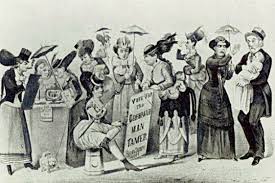As the Victorian Age drew to a close and the Edwardian period began, the British Empire found that ties to colonial dominions were weaker than they had been (James, p. 319). The Boer War had ended, but rather than eliciting patriotic fervor, it had been tiresome and had only succeeding in presenting the African inhabitants as barbarous. Mismanagement and political turmoil were the standard ethos of the period. Many believed that the era of British Imperial dominance was coming to an end, just as Rome had been destroyed by a diminishing morality (James, p. 320). Besides internal decay, external forces were also aligning against British supremacy.
Germany, Russia, and the United States were all advancing quickly, overtaking Britain’s dominating position in military and economic power (James, p. 320). These internal and external concerns led to a reinventing of what it meant to be British. It was hoped that a revitalization of economic concerns and resurgence of national self-confidence would lead to Britain regaining its earlier momentum as a world power (James, p. 320). While liberal “individualism” had served as a major tenant of British growth in the 18th and 19th centuries, it quickly became viewed as outdated.
 Rather, a new concept of imperialism arose, where the common man appreciated “the good government of his city, the efficiency with which is nation is organized, and the influence which his Empire is able to exercise in the councils, and consequently in the commerce of nations were vital for his and his children’s’ survival and prosperity” (James, p. 320). It was this attitude that would lead to the desired resurgence. Rather than relying on individualism, this approach called for a strong government and intervention into economic, political, and social concerns. It was an early attempt to deliberately plan and manufacture society (James, p. 321). This led to the development of the welfare state, which it was argued, already existed in growing societies, such as Germany and Japan (James, p. 321).
Rather, a new concept of imperialism arose, where the common man appreciated “the good government of his city, the efficiency with which is nation is organized, and the influence which his Empire is able to exercise in the councils, and consequently in the commerce of nations were vital for his and his children’s’ survival and prosperity” (James, p. 320). It was this attitude that would lead to the desired resurgence. Rather than relying on individualism, this approach called for a strong government and intervention into economic, political, and social concerns. It was an early attempt to deliberately plan and manufacture society (James, p. 321). This led to the development of the welfare state, which it was argued, already existed in growing societies, such as Germany and Japan (James, p. 321).
In military matters, a business-like attitude replaced the old “smartness, gilt braid and gallantry” (James, p. 321). Vested interests and traditional organizations were discarded. The old systems were seen as inflexible, unwieldy, and unworkable in the modern world. Though they had been used to develop the world’s greatest empire, they had come to be viewed as harmful to imperial aims for the 20th century.
Tariff reform was another strategy for renewing patriotic feelings. Free trade, which had long been a British mainstay, was targeted to be discarded in favor of protectionist legislation. This increase in revenue would be used to fund social programs (health, education, etc.) as well as leading to the organization of an imperial trade federation (James, p. 321). It was believed that these actions would improve the “welfare and contentedness” of the people. Without improving the daily life of the common man, patriotism would be choked and inhibited. “First, tariff reform is seen as a form of anti-socialism, a way of raising revenue for welfare reforms without resorting to progressive taxation. Second, tariff reform is understood to be a response to anxieties about British economic decline. In this guise it takes two forms: protection for the home market and a retaliatory tariff to prise open markets overseas. Finally, tariff reform is presented as a party political programme, either an attempt by Joseph Chamberlain to breathe new life into Liberal Unionism, or an attack by Chamberlain on the old leadership of the Tory party” (Thompson, p. 1033-34). However, this strategy failed, and its political opponents were brought to power, using free trade as a rallying cry.
The appeal to working conditions was an important consideration, though. Not only for British workers, but also for workers in the dominions, the appeal tugged at the conscience of the people (James, p. 322). Chinese workers in South Africa were the focal point of this issue, and the treatment and living conditions of these indentured servants elicited an outcry, leading to reforms. It came to be an issue that divided British politicians, with some supporting a stronger Imperial presence and control, while others feared an authoritarian and forcible intervention. This occurred at a time when socialists were gaining favor, and had a direct impact on policy (James, p. 323). The Liberal party came to be subsumed by the Labour party.
Irish Nationalism became another important facet of Edwardian England. The move to develop a more formal and directly involved Empire ran into the British attitude of self-governance, eventually producing the Irish Home Rule Act (James, p. 325). The military came close to mutiny, not wanting to “war against men who wished to remain part of the empire on behalf of those who wished to leave” (James, p. 326). Again, class politics was a major component of the situation. “Patriotism compensated for social inferiority. Thus in Britain, where there was no compulsory service, the curve of volunteer recruitment of working-class soldiers in the imperialist South African War simply reflect[ed] the economic situation. It rose and fell with unemployment. But the curve of recruitment for lower-middle-class and white-collar youths clearly reflected the appeals of patriotic propaganda” (Miller, p. 697).
These various situations led to the attempt to provide benefit for all citizens of the Empire (James, p. 327). Without this, there could be no national solidarity. It was necessary to make all workers of the Empire understand that the Empire’s existence was beneficial to them and that they were expected to have special virtues as citizens (James, p 327). Voluntary organizations took up this educational task, directing and financing massive propaganda endeavors (Cf. Bremner, who describes the development and activity of the Imperial Institute).
These organizations used entertainment, instruction, lectures, exhibitions, and rallies to further their cause (James, p. 327). They solicited the service of old war heroes and other famous people (such as Tennyson) to speak to crowds, write articles, and exhort schoolboys. One approach was to establish continuity with the past, encouraging younger people to respect the work of their ancestors and to dedicate themselves to carrying on the mission of British Imperialism. Organizations put on patriotic plays (Shakespeare’s Henry V, for example). The presence of military heroes reminded the citizenry of the price paid by Britain to become such an important world power. Patriotic songs further encouraged young men to give their lives to the Empire (James, p. 328). “Men were willing to make the ‘ultimate imperial sacrifice’ out of their strong sense of patriotism their love of country, respect for British institutions, and support for the continuance of the empire” (Miller, p. 694).
Education took on imperial topics. The benefits that Britain’s conquests had brought to savage peoples were highlighted, with any negatives brushed aside. Imperialist propaganda was relentlessly presented, and tied together with sporting events and athletic prowess (James, p. 329). Those who attended public schools quickly became fervent patriots. Those of lower classes did not receive the large amount of propaganda, so programs were initiated to “raise them up.” (James, p. 330). Popular public figures were used to reach out to these classes, and newspapers carried the patriotic message.
The development and organization of the Boy Scouts brought this educational endeavor into a practical application. This group trained boys in the use of military arms, and taught them to act in a manner that was beneficial to the empire (James, p. 330). They encouraged patriotic activity and discouraged those things that were viewed as unhelpful or unmanly (pornography, masturbation, etc.).
It was not only the males that were targeted. Recognizing that young women became the mothers of young men, organizations were developed that taught these young women how they could be good citizens of the empire, raising children that would further imperial goals (James, p. 331). In the face of the advancement of socialism, much of this propaganda was designed to counter it, replacing class distinction with a love of the Empire. The British image of the warrior who takes civilization to the barbaric savages was the image that was propagated. Referring to the Boer War, “Robert Blatchford, one of the founders of the important Socialist voice, The Clarion, wrote, ‘I am a Socialist, and a lover of peace but I am also an Englishman. I love my fellow men of all nations … but I love England more than any other country. I am not a jingo, I am opposed to war. I do not approve of this present war. But … my whole heart is with the British Troops’” (Miller, p. 695).
In the end, while these activities did develop a strong feeling of patriotism at home, an imperial union did not develop. Those soldiers who went to war quickly lost their exuberant patriotism, while maintaining a solid British desire to perform one’s duty. Loyalty to comrades was longer lasting that a false sense of patriotism (James, p. 333).
Education, entertainment, and athletics were all used to instill a renewed patriotism in the British Empire. These actions seem to have been fairly successful at home, while less so in colonial regions. Young men were instructed in ways to develop and enhance a love of the Empire, from athletic competition, The Boy Scouts, and other methods of education. Popular figures, both military and otherwise were drafted to exhort this patriotic development. Class warfare was headed off by anti-socialist activities, with a call to view oneself as a part of an important and vital empire. In this manner, each was encouraged to do his or her duty to enlighten the world. On the home front, this was successful. On the battlefront, this superficial patriotism quickly died, to be replaced with a dogged devotion to duty and honor.
Works Cited:
Bremner, Alex. “Some Imperial Institute”: Architecture, Symbolism, and the Ideal of Empire in Late Victorian Britain, 1887-93.” Journal of the Society of Architectural Historians, Vol. 62, No. 1 (Mar., 2003), pp. 50-73.
James, Lawrence. The Rise and Fall of the British Empire. New York: St. Martin’s Griffin, 1994.
Miller, Stephen M. “In Support of the “Imperial Mission”? Volunteering for the South African War, 1899-1902.” The Journal of Military History, Vol. 69, No. 3 (Jul., 2005), pp. 691-711.
Thompson, Andrew S. “Tariff Reform: An Imperial Strategy, 1903-1913.” The Historical Journal, Vol. 40, No. 4 (Dec., 1997), pp. 1033-1054.






